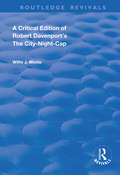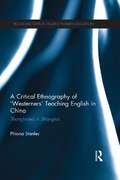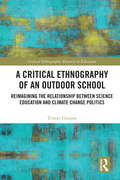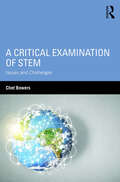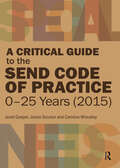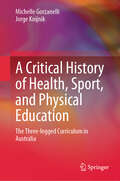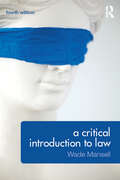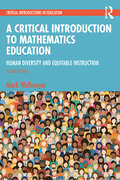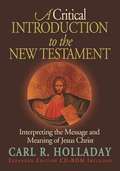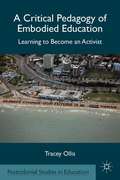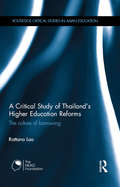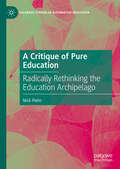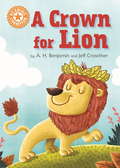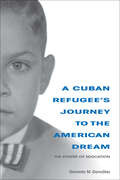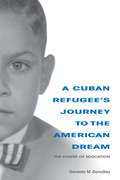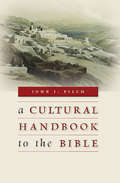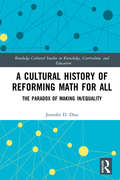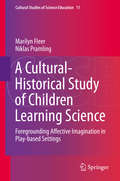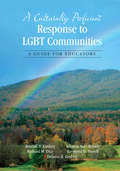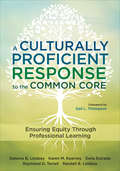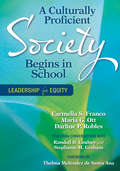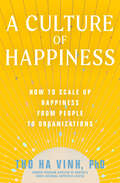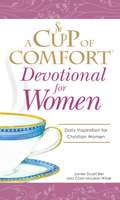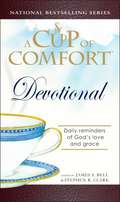- Table View
- List View
A Critical Edition of Robert Davenport's The City Night-Cap (Routledge Revivals)
by Robert DavenportOriginally published in 1979, this volume includes the full, edited, 1661 play of Robert Davenport, 'The City Night-Cap', alongside textual notes, including an introduction on the man and his works, theatrical history, characterization, theme and structure, and setting.
A Critical Ethnography of 'Westerners' Teaching English in China: Shanghaied in Shanghai (Routledge Critical Studies in Asian Education)
by Phiona StanleyTens of thousands of Western ‘teachers’, many of whom would not be considered teachers elsewhere, are employed to teach English in public and private education in China. Little has previously been known, except anecdotally, about their experiences, about the effect they have on education in the context, or on students’ perceptions of ‘the West’ that result from this contact. This book is an ethnographic study of Westerners’ lived experiences teaching English in Shanghai, China. It is based on three years of groundbreaking research into the pre-service training, classroom practices, personal identities and motives, and local socially constructed roles of a group of ‘backpacker teachers’ from the UK, the USA and Canada. It is a study that goes beyond the classroom, addressing broader questions about the sociology, and politics, of transnational education and China’s evolving relationship with the outside world.
A Critical Ethnography of an Outdoor School: Reimagining the Relationship between Science Education and Climate Change Politics (Critical Ethnographic Research in Education)
by Tristan GleasonBy using critical ethnographic research to explore the practices and policies that sustain a residential outdoor school in the US, this volume problematizes the relationship between science education and climate change politics in the United States. Weaving together empirical data from field work with theoretical resources spanning the sciences and humanities, this volume demonstrates how community activism, political alliances, and policy change have guaranteed the survival of an outdoor school in Oregon. This example enables artful re-examination of the relationship between science education, politics, and policy more broadly, as well as the relation of science education to climate change politics in particular. Gleason ultimately reconstructs science education towards epistemic and ontological pluralism, and illustrates how critical ethnographic research can instigate a reimagining of the relationship between curriculum and how we relate to the world. This text will benefit researchers, academics, and educators in higher education with an interest in the philosophical underpinnings and implications of science education, environmental education, and educational policy more broadly. Those specifically interested in critical ethnographic research will also benefit from this book.
A Critical Examination of STEM: Issues and Challenges (Sociocultural, Political, and Historical Studies in Education)
by Chet BowersThis critical examination of STEM discourses highlights the imperative to think about educational reforms within the diverse cultural contexts of ongoing environmental and technologically driven changes. Chet Bowers illuminates how the dominant myths of Western science promote false promises of what science can achieve. Examples demonstrate how the various science disciplines and their shared ideology largely fail to address the ways metaphorically layered language influences taken-for-granted patterns of thinking and the role this plays in colonizing other cultures, thus maintaining the myth that scientific inquiry is objective and free of cultural influences. Guidelines and questions are included to engage STEM students in becoming explicitly aware of these issues and the challenges they pose.
A Critical Guide to the SEND Code of Practice 0-25 Years (2015)
by Jackie Scruton Janet Goepel Caroline WheatleyYou will find this an indispensable resource if you are involved with children or young people with special educational needs or disability.Uncover the intricacies of statutory rules and responsibilities outlined in the code of practice through our accessible guide, which bridges the gap between policy and real-world application. Engaging case studies and critical insights throughout the book help you to understand and interpret these in context.Professionals and practitioners will be able to identify complexity and dilemmas, understand perspectives that may be different from their own, and consider theoretical frameworks that encourage and support critical thinking and reflection.Whether you're a trainee, teacher, SENCO, or a health and social care professional, this practical guide to the SEND Code of Practice is your go-to, essential companion. Parents, carers and families of these children will also find it invaluable. Get ready to transform theory into actionable insights and make a lasting impact on the lives of those you work with.
A Critical History of Health, Sport, and Physical Education: The Three-legged Curriculum in Australia
by Jorge Knijnik Michelle GorzanelliThis book fills a gap in literature by generating a combined history of Physical Education (PE), School Sport (SS) and Health Education (HE) in New South Wales (NSW) public schools from 1880 to 2024. It includes broad discussions on how political issues such as the World Wars influenced (i) the PE curriculum, which was used as a medium to prepare a &‘fit&’ army, (ii) the school sport system, which acted as an expression of national strength via showcasing sporting prowess on the international stages of the Olympic Games, and (iii) the health education curriculum, which addressed infectious diseases resulting from poor hygiene associated with poverty. The book also adopts a socio-cultural perspective to the constructs of PE, SS, and HE curricula and highlights significant local, national, and international historical events and issues as factors driving curriculum developments and paradigm shifts in these subjects in the NSW public education and beyond. It brings new and engendering socio-historical findings to the discipline fields of PE, SS, and HE, combined with an innovative methodology in critical historiographical studies.
A Critical Introduction to Law
by Wade Mansell Belinda Meteyard Alan ThomsonChallenging the usual introductions to the study of law, A Critical Introduction to Law argues that law is inherently political and reflects the interests of the few even while presenting itself as neutral. This fully revised and updated fourth edition provides contemporary examples to demonstrate the relevance of these arguments in the twenty-first century. The book includes an analysis of the common sense of law; the use of anthropological examples to gain external perspectives of our use and understanding of law; a consideration of central legal concepts, such as order, rules, property, dispute resolution, legitimation and the rule of law; an examination of the role of law in women's subordination and finally a critique of the effect of our understanding of law upon the wider world. Clearly written and admirably suited to provoking discussions on the role of law in our contemporary world, this book is ideal for undergraduate and postgraduate students reading law, and will be of interest to those studying legal systems and skills courses, jurisprudence courses, and law and society.
A Critical Introduction to Mathematics Education: Human Diversity and Equitable Instruction (Critical Introductions in Education)
by Mark WolfmeyerThe second edition of Mark Wolfmeyer’s award-winning primer offers future and current math teachers an introduction to the connections that exist between mathematics and a critical orientation to education, one that accounts for race, social class, gender, sexuality, language diversity, and ability. Expanded and updated from the first edition, this book demonstrates how elements of human diversity and intersectionality have real effects in the mathematics classroom, and prepares teachers with a more critical math education that increases accessibility and equity for all students. By refocusing math learning toward the goals of democracy and social and environmental crises, the book also introduces readers to broader contemporary school policy and reform debates and struggles, especially in light of Covid-19 and the ongoing struggle for racial equity. Featuring concrete strategies and examples in both formal and informal educational settings, as well as discussion questions for teachers and students, text boxes with examples of critical education in practice, a glossary, and suggestions for further reading, Mark Wolfmeyer shows how critical mathematics education can be put into practice, relevant for undergraduate and graduate students in education, current teachers, and teacher educators.
A Critical Introduction to the New Testament
by Carl R. HolladayThis book introduces the New Testament in two senses: it not only provides basic literary and historical information on each of the twenty-seven writings but also orients readers to the religious, theological, and ethical issues related to the message and meaning of Jesus Christ. The overall goal is to help interested readers of the New Testament become informed, responsible interpreters of these writings and thereby enrich their personal faith and understanding. By giving special emphasis to how the New Testament has helped shape the church's identity and theological outlook throughout the centuries, as well as the role it has played within the broader cultures of both East and West, this introduction also seeks to assist readers in exercising creative, informed leadership within their own communities of faith and in bringing a deeper understanding of early Christianity to their conversations with the wider public. Along with separate chapters devoted to each New Testament writing, there are chapters explaining how this collection of texts emerged as uniquely authoritative witnesses to the church's faith; why they were recognized as canonical whereas other early Christian writings were not; how the four canonical Gospels are related to one another, including a discussion of the Synoptic Problem; how the Jesus tradition--his teachings, stories from his ministry, and the accounts of his suffering, death and resurrection--originated and developed into Gospels written in narrative form; and how the Gospels relate to Jesus Christ as he was and is. Also included is a chapter on the writings of Paul and how they emerged as a collection of authoritative texts for the church. This chapter includes a discussion of ancient letter-writing, special considerations for interpreting the Pauline writings, and Paul's decisive influence within the history of the church and western culture.
A Critical Pedagogy of Embodied Education
by Tracey OllisExplores the differences and similarities between two groups: lifelong activists who have been engaged in campaigns and socials movements over many years and circumstantial activists, those protestors who come to activism due to a series of life circumstances. Outlines the pedagogy of activism and the process of learning to become an activist.
A Critical Study of Thailand's Higher Education Reforms: The culture of borrowing (Routledge Critical Studies in Asian Education)
by Rattana LaoThis book offers a critical examination of contemporary higher education reforms in Thailand situated in the broader historical, socio-economic and political changes. Through a qualitative case study with three methods of inquiry, this book explores why different 'global education policies' such quasi-privatisation, internationalization, as quality assessment (QA) have resonated in Thailand higher education sector. Grounded in policy borrowing and lending, this book uses the politics, economics and culture of borrowing to analyse major reforms in Thailand for the past one hundred years. It is argued that historical legacy, policy contexts and belief systems of policy elites play pivotal roles in facilitating policy changes or the lack thereof. While historical analysis elucidates that the Thai state has always been an active borrower of western ideas, the perseverance of the 'Thai-ness' discourse has often been used to suggest its so-called independence and idiosyncrasy. This in-depth analysis of the Thai case aims to contribute to the critical studies in Asian education, comparative higher education, policy borrowing and lending and Thai studies. The Culture of Borrowing intensively studies the policy appropriation in the Thai education system by analysing: • Selective Borrowing and the Historical Development of Thai Higher Education • The Asian Economic Crisis as Window of Opportunity: Autonomous University • Internationalization of Teaching: Quantitative and Qualitative Challenges • The Emergence of Quality Policies and their Rationales • The Intended and Unintended Consequences of Quality Policies This book will appeal to researchers in Education, particularly to scholars studying educational policies within the context of tertiary education. It will also interest scholars specialising in Asian and South-east Asian Studies.
A Critique of Pure Education: Radically Rethinking the Education Archipelago (Palgrave Studies in Alternative Education)
by Nick PeimThis book analyses educational theory in order to offer an alternative view of the history of education in modernity. It provides a new understanding of education as a phenomenon that draws on powerful lines of thinking, but also makes a significant departure from the conventional wisdom of both education policy and education studies. These perspectives offer an original and challenging account of what education is and of what politics has become, providing resources to rethink education as a fundamental dimension of the unprecedented political order of our time. It does this through a focus on what it takes to be the key, complex and expanding political apparatus of education. Taking the school to be the paradigm institution of modernity and beyond, the book proposes that we see the school as central to contemporary political ontology.
A Crown for Lion: Independent Reading Orange 6 (Reading Champion #128)
by A.H. BenjaminIn this fun, animal story, Lion is looking for a crown - he wants everyone to know he is the king. The animals try many different things, but nothing seems to work... until Lion has a sneezing fit!Reading Champion offers independent reading books for children to practise and reinforce their developing reading skills.Fantastic, original stories are accompanied by engaging artwork and a reading activity. Each book has been carefully graded so that it can be matched to a child's reading ability, encouraging reading for pleasure.Independent Reading: Orange stories are perfect for children aged 5+ who are reading at book band 6 (Orange) in classroom reading lessons.
A Cuban Refugee's Journey to the American Dream: The Power of Education (Well House Bks.)
by Gerardo M. GonzálezA touching memoir recounting the journey of a young Cuban immigrant to the US who went on to become a professor and university dean.In February 1962, three years into Fidel Castro’s rule of their Cuban homeland, the González family—an auto mechanic, his wife, and two young children—landed in Miami with a few personal possessions and two bottles of Cuban rum. As his parents struggled to find work, eleven-year-old Gerardo struggled to fit in at school, where a teacher intimidated him and school authorities placed him on a vocational track. Inspired by a close friend, Gerardo decided to go to college. He not only graduated but, with hard work and determination, placed himself on a path through higher education that brought him to a deanship at the Indiana University School of Education.In this deeply moving memoir, González recounts his remarkable personal and professional journey. The memoir begins with Gerardo’s childhood in Cuba and recounts the family’s emigration to the United States and struggles to find work and assimilate, and González’s upward track through higher education. It demonstrates the transformative power that access to education can have on one person’s life. Gerardo’s journey came full circle when he returned to Cuba fifty years after he left, no longer the scared, disheartened refugee but rather proud, educated, and determined to speak out against those who wished to silence others. It includes treasured photographs and documents from González’s life in Cuba and the US. His is the story of one immigrant attaining the American Dream, told at a time when the fate of millions of refugees throughout the world, and Hispanics in the United States, especially his fellow Cubans, has never been more uncertain.“Author and educator Gerardo M. González brilliantly illustrates the joys and struggles of the refugee experience, and the inarguable role of education as an open door to opportunity. This is a delightful read, and one that will inspire you to achieve greatness regardless of the odds.” —Dr. Eduardo J. Padrón, President, Miami Dade College“There can be no more persuasive testimony to the power of intelligence, commitment, and inspiration than Gerardo M. González’s memoir. The contribution of immigrants to America’s prosperity and national achievements is undeniably impressive. Yet, this transformational story of challenge and achievement, while individually exceptional, is nonetheless emblematic of the experience of countless immigrants who have made America better than it could otherwise have been. No finer antidote to the simplistic sloganeering of the immigration debate exists.” —John V. Lombardi, President Emeritus, University of Florida, and author of How Universities Work
A Cuban Refugee's Journey to the American Dream: The Power of Education (Well House Books)
by Gerardo M. GonzálezIn February 1962, three years into Fidel Castro’s rule of their Cuban homeland, the González family—an auto mechanic, his wife, and two young children—landed in Miami with a few personal possessions and two bottles of Cuban rum. As his parents struggled to find work, eleven-year-old Gerardo struggled to fit in at school, where a teacher intimidated him and school authorities placed him on a vocational track. Inspired by a close friend, Gerardo decided to go to college. He not only graduated but, with hard work and determination, placed himself on a path through higher education that brought him to a deanship at the Indiana University School of Education. In this deeply moving memoir, González recounts his remarkable personal and professional journey. The memoir begins with Gerardo’s childhood in Cuba and recounts the family’s emigration to the United States and struggles to find work and assimilate, and González's upward track through higher education. It demonstrates the transformative power that access to education can have on one person’s life. Gerardo’s journey came full circle when he returned to Cuba fifty years after he left, no longer the scared, disheartened refugee but rather proud, educated, and determined to speak out against those who wished to silence others. It includes treasured photographs and documents from González’s life in Cuba and the US. His is the story of one immigrant attaining the American Dream, told at a time when the fate of millions of refugees throughout the world, and Hispanics in the United States, especially his fellow Cubans, has never been more uncertain.
A Cultural Handbook to the Bible
by John J. PilchThe task of interpreting the Bible — which was written by and to people living in very different cultural contexts from contemporary Western society — can seem monumental. The opposite is also true: people can easily forget that studying the Bible is a type of cross-cultural encounter, instead reading their own cultural assumptions into biblical texts.In A Cultural Handbook to the Bible John Pilch bridges this cultural divide by translating important social concepts and applying them to biblical texts. In short, accessible chapters Pilch discusses sixty-three topics related to the cosmos, the earth, persons, family, language, human consciousness, God and the spirit world, and entertainment. Pilch's fresh interpretations of the Bible challenge traditional views and explore topics often overlooked in commentaries. Each chapter concludes with a list of useful references from cultural anthropology or biblical studies, making this book an excellent resource for students of the Bible.
A Cultural History of Reforming Math for All: The Paradox of Making In/equality (Routledge Cultural Studies in Knowledge, Curriculum, and Education)
by Jennifer D. DiazWhile many accept that math is a universal, culturally indifferent subject in school, this book demonstrates that this is anything but true. Building off of a historically conscious understanding of school reform, Diaz makes the case that the language of mathematics, and the symbols through which it is communicated, is not merely about the alleged cultural indifference of mathematical thinking; rather, mathematical teaching relates to historical, cultural, political, and social understandings of equality that order who the child is and should be. Focusing on elementary math for all education reforms in America since the mid-twentieth century, Diaz offers an alternative way of thinking about the subject that recognizes the historical making of contemporary notions of inequality and difference.
A Cultural History of Translation in Early Modern Japan
by Rebekah ClementsThe translation of texts has played a formative role in Japan's history of cultural exchange as well as the development of literature, and indigenous legal and religious systems. This is the first book of its kind, however, to offer a comprehensive survey of the role of translation in Japan during the Tokugawa period, 1600-1868. By examining a wide range of translations into Japanese from Chinese, Dutch and other European texts, as well as the translation of classical Japanese into the vernacular, Rebekah Clements reveals the circles of intellectual and political exchange that existed in early modern Japan, arguing that, contrary to popular belief, Japan's 'translation' culture did not begin in the Meiji period. Examining the 'crisis translation' of military texts in response to international threats to security in the nineteenth century, Clements also offers fresh insights into the overthrow of the Tokugawa shogunate in 1868.
A Cultural-Historical Study of Children Learning Science: Foregrounding Affective Imagination in Play-based Settings (Cultural Studies of Science Education #11)
by Marilyn Fleer Niklas PramlingThis book moves beyond the traditional constructivist and social-constructivist view of learning and development in science. It draws upon cultural-historical theory in order to theorise early childhood science education in relation to our currently globalised education contexts. The book argues that concept development in science for young children can be better theorised by using Vygotsky's concept of Imagination and creativity, Vygotsky's theory of play, and his work on higher mental functions, particularly the concept of inter and intrapsychological functioning. Key concepts are extracted from the theoretical section of the book and used as categories for analysis in presenting evidence and new ideas in the second section of the book. In this second part of the book, the authors examine how science knowledge has been constructed within particular countries around the globe, where empirical research in early childhood science education has occurred. The third part of the book examines the nature of the encounter between the teacher and the child during science learning and teaching. In the final part of the book the authors look closely at the range of models and approaches to the teaching of early childhood science that have been made available to early childhood teachers to guide their planning and teaching. They conclude the book with a theoretical discussion of the cultural-historical foundation for early childhood science education, followed by a model of teaching scientific concepts to young children in play-based settings, including homes and community contexts.
A Culturally Proficient Response to LGBT Communities: A Guide for Educators
by Dr Kikanza Nuri-Robins Delores B. Lindsey Randall B. Lindsey Dr Raymond D. Terrell Richard M. DiazHigh impact strategies to improve student outcomes Positive systemic change begins when school leaders elevate understanding and propel schools toward safe and diverse-friendly environments. To combat anti-gay discrimination, educators often use silence, policy, legislation and compliance. This brave book maintains that building safe and welcoming schools begins not only with effective and appropriate policy but also with inside-out analysis of one’s own beliefs and values. Resulting cultural proficiencies boost empathy and improve learning environments. On this simple premise, readers will find: Inside-out growth through personal stories and case-studies Reflection through activities appropriate for individuals and teams Insight through current responses to bullying
A Culturally Proficient Response to the Common Core: Ensuring Equity Through Professional Learning
by Delores B. Lindsey Randall B. Lindsey Dr Raymond D. Terrell Karen M. Kearney Delia M. EstradaLead a Common Core implementation that closes achievement gaps! This illuminating book shows how central Common Core tenets—rigor, meaningful curricula and assessment, and higher order thinking—can become educational realities for every child in your school or district. This timely resource enables readers to: Understand how underlying beliefs related to historically-underserved students may create roadblocks to effective instruction Create a school culture where diversity is valued, including developing relevant professional learning Compile and analyze meaningful data that enables faculty to better reach students from all backgrounds Advance the goal of college and career-readiness for all learners
A Culturally Proficient Society Begins in School: Leadership for Equity
by Carmella S. Franco Maria G. Ott Darline P. RoblesThe three Latina superintendents who coauthored this book go beyond discussing the issue of equity in education—they live it. These trailblazing women chronicle their childhoods, careers, and challenges and share their vision to transform schools into places of equity and excellence. Through the lens of cultural proficiency, their stories enhance readers’ understanding of: <p><p> Barriers to educational opportunity and equity <p> Conditions that help promote success for underserved students <p> Ways to leverage culture as an asset <p. Links between high-quality education for some and excellence for all learners
A Culture of Happiness: How to Scale Up Happiness from People to Organizations
by Tho Ha VinhPractical principles for creating conditions for happiness at scale from the program director of the Gross National Happiness Center of Bhutan, the only country in the world to measure progress by the happiness of its citizens.Despite countless happiness programs focused on individual well-being, are we any happier, really? Is it in fact possible to be fully happy within a miserably dysfunctional society built to keep structures of inequity in place? Possible, perhaps, but not easy. While the pursuit of happiness is a much-celebrated ideal, how can countries and communities design the right environments for people to lead happy lives? Personal programs for happiness that include mindfulness, empathy, and gratitude are a good start, but without structural changes, they can only go so far. Taking the case of the country of Bhutan as an example, the nation's first Gross National Happiness program director Tho Ha Vinh explains how the principles of happiness can and must apply to people, families, and communities at scale to produce the conditions for a truly satisfying life. More and more people feel that we live in a time of transition and that our very survival on this planet depends on renewing the way we live together in society. Gross National Happiness is an innovative development paradigm that puts the interconnected happiness of all people and the well-being of all life forms at the center of progress. Based on real-life experiences, this book shows a multitude of practical methods for strategic thinkers and change makers to apply the framework of Gross National Happiness to bring about positive change in schools, businesses, and communities.
A Cup of Comfort Devotional for Women: A daily reminder of faith for Christian women by Christian Women (Cup of Comfort)
by James Stuart Bell Carol McLean WildeIn this special addition to the bestselling A Cup of Comfort series, more than 100 contributors extend a sisterly hand to help you stay on the path of Christian love and devotion every day of the year.You will cherish real-life heroines such as:Mimi, whose love for her daughter and trust in the Lord allows her to confront her greatest fearMaralee, whose kidney cancer is diagnosed on Valentine's Day and, by God's grace, is healed in time for her beloved son's wedding that JuneRenee, a substitute teacher who asks God to help her connect with a troubled student With a touching story for each month and biblical passages as well as accounts of women's real-life encounters with God for every day in the year, A Cup of Comfort Devotional for Women is a daily dose of grace and goodness for Christians everywhere.
A Cup of Comfort Devotional: Daily Reflections to Reaffirm Your Faith in God (Cup of Comfort)
by James Stuart Bell Stephen ClarkIn A Cup of Comfort Devotional 366 entries provide a daily dose of comfort, strength and inspiration. The perfect bedside companion to be read in the morning or evening, this magnificent work is the first of its kind to combine biblical passages and commentary with a dozen touching, heartfelt stories that have become the hallmark of A Cup of Comfort. Readers will cherish stories of Jesus entering into everyday life, such as: Ul>A young woman, traumatized during her first helicopter ride, says the Lord's Prayer and finds herself in awe as she looks down on God's creation; A woman finds out through a co-worker that Jesus can meet her right in the midst of her depression;A mother learns an unforgettable lesson of faith when a doll representing the baby Jesus in her outdoor nativity scene is stolen;With entries linked to the holidays and seasons, A Cup of Comfort Devotional brightens every day of the year, deepening our joys and sustaining us through the darker times.
